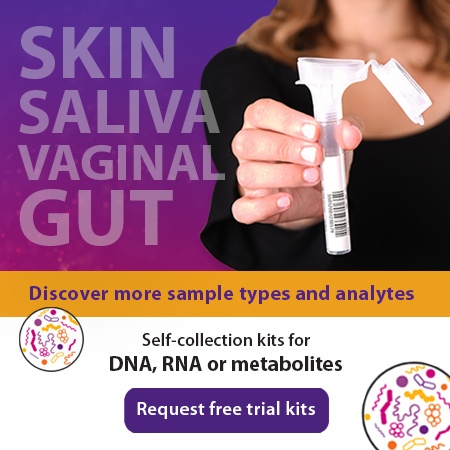2020-02-07
There have been a number of interesting microbiome research projects published in the past year. New trending topics such as, skin microbiome, metabolomics, canine gut microbiome, and much more have dominated conversations at microbiome conferences worldwide. Now that 2019 is behind us, we wanted to highlight a few interesting microbiome research studies from last year.
Here are 4 must-read microbiome research studies from 2019.
1. Vaginal microbiome and repeated implantation failure in women
Varinos, Inc. is a Japanese company that specializes in infertility and the vaginal microbiome. In May 2019, they published a paper exploring the micro environment of the female reproductive tract to explain why some women have repeated implantation failure.
"Lactobacillus species are classically known to dominate the vaginal cavity of premenopausal women. Vaginal Lactobacilli play a role in the maintenance and homeostasis of the local microbial milieu by dropping pH through production of lactic acid.”[1]
- Having Lactobacillus representing 90% or more of the endometrial fluid microbiome (located in the uterus) was more successful for embryo implantation when performing the in vitro fertilization-embryo transfer (IVF-EF) treatment on infertile women.
- Having a non-Lactobacillus dominant endometrial fluid microbiome has shown to produce poor reproductive outcome, resulting in miscarriage and implantation failure.
Repeated implantation failure (RIF): is an infertile condition that results in serial failed conception following 3 or more transfer cycles with good quality embryos.
- According to Kitaya et al., it happens in 15-20% of infertile couples taking part in the IVF-EF program. [1]
The team at Varinos (Kitaya et al.) wanted to explore the relationship between the microbiome of vaginal secretions and the endometrial fluid with women who have a history of repeated implantation failure.
They collected vaginal microbial samples using OMNIgene·VAGINAL and endometrial biopsy samples from a group of 28 women with a history of repeated implantation failure.
How does the vaginal microbiome affect repeated implantation failure?
The study revealed that Burkholderia, a bacteria responsible for meliodosis (also known as, Whitmore's disease), was not detected in infertile women undergoing their first IVF-EF treatment.
They suggested that that absence of this bacteria may be causing tubo-ovarian abscess (one of the complications associated with pelvic inflammatory disease) and could be contributing to repeated implantation failure in infertile women.
To learn more about this study and other vaginal microbiome research Varinos conducts, click here.
Interested in vaginal microbiome sampling? Click here to request a free sample of OMNIgene·VAGINAL or email us at info@dnagenotek.com for more information.
[Related content: Unlocking the Mysteries of the Vaginal Microbiome, Varinos Inc. – Q&A with a Japanese biotech start-up]
2. Multiomics, multinutrients and ADHD in youth
Current pharmacologic treatments for children with Attention-Deficit/Hyperactivity Disorder (ADHD) often improve symptoms but have been known to have many side-effects. Because of this, there has been a demand for non-pharmacologic treatments and more supplements-based treatments for ADHD.[2]
Johnstone et al. wanted to examine the efficacy of a 36-ingredient micronutrient supplement as a treatment for children with ADHD via The Micronutrients for ADHD in Youth (MADDY) study.
In October 2019, Johnstone et al. published a paper outlining the rationale and design of this study.
"While current treatments improve ADHD symptoms in some children, symptoms frequently persist into adulthood. ADHD in children commonly portends poor long-term outcomes, including lower educational and occupational achievement, unstable relationships, incarceration, and ongoing psychiatric problems. Pharmacologic interventions are associated with side effects, and possible long-term health consequences. Such concerns have led to investigations of other options, including nutrient-based treatments.” [2]
Using the power of multiomics to solve the question about supplements and ADHD
To test hypotheses related micronutrient-driven behavioral changes and the micronutrients' mechanisms of action, the study plans to collect samples of blood, urine, hair, saliva (using Oragene·DNA), and stool (OMNIgene·GUT) to investigate, nutrient and hormonal levels, DNA, RNA, micronutrient residues, the microbiome and the metabolome.
The study is taking place in 3 locations, the Ohio State University, Oregon Health & Science University and the University of Lethbridge in Alberta, Canada. Johnstone et al. believe that once complete, the study results will have the potential to address currently unmet treatment needs with ADHD children and improve outcomes throughout development and into adulthood.
Interested to learn more about the MADDY study? Click here.
[Related content: Multiomics experimental design and computational analysis – discussion panel at TMC]
3. Personalized diet - microbiome
Diet is incredibly important and affects people in many different ways, including our sleep, our moods, and more. Recently, diet has become a key determinant of the human gut microbiome variation.
Dr. Dan Knights (Associate Professor of Computer Science and the Biotechnology Institute and CEO of CoreBiome) and his team (Johnson et al.) from the University of Minnesota, wanted to explore the fine-scale relationships between daily food choices and the human gut microbiome composition.[3]
UPDATE: On May 12, 2020, CoreBiome rebranded as Diversigen Inc.
In June 2019, they published a paper where they used multivariate methods to integrate 24 hour food records and fecal shotgun metagenomes from 34 healthy human subjects collected daily over 17 days.
They were able to test to see if each subject’s daily diet microbiome interactions were unique to the individual. Through a variety of tests they found that food-microbe interactions were highly personalized.
“The personalized response might be one reason for the small observed effect sizes of diet shaping the gut microbiome in population-level studies. In other words, the effect of diet might be much greater than these studies suggest, but if the same foods impact different bacterial populations in an individualized manner, such effects may not be detectable in cross-sectional studies.” [3]
Diet and microbiome interaction: the new start to a personalized diet?
Johnson et al.’s findings suggest:
- A food-based intervention aimed to promote or suppress a particular bacterial species may need to be tailored to the specific composition of the individual’s microbiome
- Specifics of personalized diet-microbiome interactions still need to be investigated beyond their relationship with markers of blood glucose control.
- Yesterday’s diet has the largest effect on tomorrow’s microbiome, the day before yesterday has a moderate effect, the day prior a smaller effect, and so on.
“In this approach, the combination with longitudinal sampling and multi-day dietary records, revealed personalized diet-microbiome interactions and may be useful in future population-wide studies that aim to determine the exact role in dietary foods in shaping the gut microbiome.” [3]
Interested in learning more about microbiome sequencing and services? Click here for more information on what DNA Genotek has to offer.
Related content:
Considering adding microbiome to your research? Thoughts from Dr. Dan Knights
4. Alterations in oral microbiome can be associated with diabetes
Research in oral microbiome has grown over the years, and scientists are now discovering how oral microbiome alterations can cause a number of human health problems. One example is: obesity. According to Mervish et al., certain bacterial strains have been associated with obesity and periodontal disease, however, not much is known about the oral microbiome in children. [4]
“Understanding the relationship between oral health and childhood growth could help identify preventable factors contributing to obesity and related conditions, including onset of menarche which is associated with obesity.”
To explore this further, in September 2019, Mervish et al. published a paper investigating the saliva microbiome of 25 girls ages 7 to 15 and their mothers using OMNIgene·ORAL. They examined the associations of microbiome richness, diversity, and relative abundance with pubertal and demographic factors as well as oral health.
Oral microbiome composition: Girls with obesity vs girls with normal weight
- The oral microbiomes of the girls and their mothers were diverse and exhibited a rich microbial environment.
- Girls who were overweight had a lower richness compared to their mothers and girls with normal weight.
- All mothers had a higher diversity in their microbiome than the girls.
- Overweight girls had fewer taxa within Lactobacillus species but more in the Lactorbacillales
- High amounts of Lactobacillus in the gut has also been reported to be associated with obese children.
According to Mervish et al. a bi-directional pathway linking obesity and oral disease has been proposed. The role of altered inflammation is suggested to be central to this pathway, which is a key feature of both obesity and dental microbial diseases such as periodontitis. Genetic factors could also contribute to the difference in oral bacterial colonization in adolescents and children.
Interested in collecting oral microbiome from saliva? Click here to request a free sample of OMNIgene·ORAL or email info@dnagenotek.com for more information.
Related content:
Innovation to facilitate oral microbiome studies
What will microbiome research look like in 2020?
Let us know in the comments section about what research topics you found interesting from 2019 and what research trends you think will dominate 2020.
To request free samples of any of DNA Genotek’s OMNIgene microbiome product family, click below.
References
[1] Kitaya K et al. Characterization of Microbiota in Endometrial Fluid and Vaginal Secretions in Infertile Women with Repeated Implantation Failure. Mediators of Inflammation. 2019:2893437 (2019).
[2] Johnstone JM et al. Rationale and design of an international randomized placebo-controlled trial of a 36-ingredient micronutrient supplement for children with ADHD and irritable mood: The Micronutrients of ADHD in Youth (MADDY) study. Contemp Clinical Trials Comm. 16:100478 (2019).
[3] Johnson AJ et al. Daily sampling reveals personalized diet-microbiome associations in humans. Cell Host Microbe. 25(6): 789-802 (2019).
[4] Mervish NA et al. Associations of the Oral Microbiota with Obesity and Menarche in Inner City Girls. J Child Obes. 4(1): doi.10.21767/2572-5394.100068 (2019).


